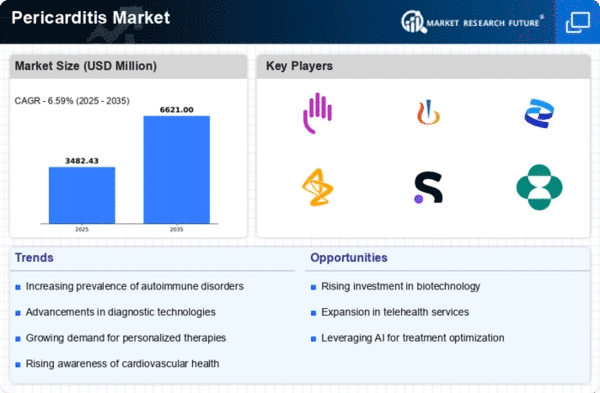Market Trends
Key Emerging Trends in the Pericarditis Market
The Pericarditis market is undergoing dynamic changes influenced by advancements in diagnostic techniques, evolving treatment strategies, and a deeper understanding of the underlying causes of pericardial inflammation. Pericarditis, characterized by inflammation of the pericardium, has spurred innovations in therapeutics and diagnostic tools to address the diverse spectrum of this cardiac condition. One of the significant trends in the Pericarditis market is the integration of advanced imaging technologies for accurate diagnosis. Echocardiography, cardiac MRI, and CT scans are becoming pivotal in precisely assessing pericardial inflammation, guiding clinicians in formulating tailored treatment plans. Biomarkers for pericarditis is of the cutting edge of clinical applications in the current market and assists in early detection and prompt response. The framed markers like C-react (CRP) and troponin help to diagnose pericarditis, tracking and monitoring the disease activity, therefore calling for a more interactive control plan. Giving NSAIDs permits to play the role of the cornerstone in the treating pericarditis, serving as the primary approach to reduce inflammation, as well as the symptoms. Research and development dedicated to this type of regimen shows that the right balance is necessary to take into account the effectiveness of the drugs as well as the possibility of side effects that may vary among the different patient populations. As more evidence emerges, colchicine is rapidly gaining popularity for its proprietary role in the pericarditis market, specifically in preventing relapsing pericarditis. Demonstrated in studies, colchicine is found to be a helpful combo-medication in the management of pericarditis, which lowers the probability of recurrences and ensures a better overall condition is achieved. Investment in novel commercial solutions, such as, biologics is on the rise on the grounds of advanced stage diseases when oncologic standard treatments are futile. Biologics are new drugs targeting one or several inflammatory pathways (like the cell that produced interleukin-1 or IL-1)-innovative diagnostics for management of specific patients with chronic or recurrent (unsatisfactory response to standard) pericarditis. Amongst the nuances of Pericarditis market, the handling of complications such as cardiac tamponade is included as well. Expansion in special physcardiocentesis techniques, hemodynamic control and percutaneous drainage is leading development on dealing with critical cases where fluid housing to the heart is accumulated. Immunomodulators are the new shiny faces of the market, with how immune system alterations are increasingly becoming the main focus in treatment of pericarditis. Agents such as IVIG and immunosuppressants, that have been proposed for potentially mediating immune reactions in distinct pools of pericarditis patients are worthy of study at this point.



















Leave a Comment